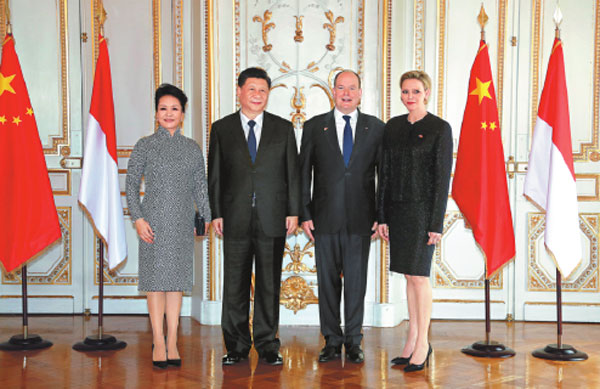Xi's visit to put Sino-EU ties on track


President Xi Jinping's visit to Italy, Monaco and France from March 21 to 26 comes at an important juncture for European Union-China relations.
Last week the European Commission issued a paper describing China as a "systematic rival" and called for more "reciprocity" in relations with Beijing. This new strategy was largely endorsed by the European Council on March 22 in preparation for the annual EU-China Summit on April 9 when Premier Li Keqiang visits Brussels.
Why the change in the EU's approach? The European Commission has been under pressure from member states and business organizations to take a tougher line on China. Many EU leaders were also swayed by a recent report from the confederation of German industries stating that EU companies still faced serious problems accessing the Chinese market and that Chinese State-owned enterprises benefited from unfair subsidies.
These criticisms were reinforced by intense lobbying from the United States urging European governments not to accept Huawei technology in developing their 5G networks, and not to support China's Belt and Road Initiative. Washington made veiled threats about future cooperation on security if Europe accepted Huawei's technology. But Europe is unlikely to follow in the US' footsteps. The US has not produced any concrete evidence of Huawei's espionage, and countries such as Britain have set up mechanisms to control and monitor all sensitive technology. There is also a feeling in some quarters that the US pressure is due to its own backwardness in 5G technology.
Despite US pressure, Italy signed a memorandum of understanding on the Belt and Road Initiative during Xi's visit. Italy argued that it was way behind other European countries in attracting Chinese foreign direct investment and signing the MoU was not a contradiction to the EU's overall strategy toward China. In addition, Rome stated that the MoU did not cover 5G technology.
Almost half the EU member states have signed MoUs with China regarding the Belt and Road Initiative. But the European Commission as well as France, Germany and the United Kingdom continue to have reservations citing the lack of transparency and the potential debt trap for countries taking huge Chinese loans. In its own connectivity strategy linking Europe and Asia, the EU placed great emphasis on the guidelines of the International Monetary Fund and the World Bank concerning transparency and sustainability, both environmental and financial. These views will be put forward again by the EU at the second Belt and Road Forum for International Cooperation in Beijing next month.
While Italy takes a more welcoming attitude to the Belt and Road Initiative and Chinese foreign direct investment, France is placing more emphasis on the importance of China and the EU to work together to safeguard the rules-based international order. This is why French President Emmanuel Macron invited German Chancellor Angela Merkel and European Commission President Jean-Claude Juncker to meet with Xi in Paris to discuss the future of multilateralism. In the first instance, this means support for and reform of the World Trade Organization. The EU has put forward proposals to reform the world's top trade body taking into account technological and financial changes of the past decade. Brussels wants the WTO to set rules for e-commerce and restrict industrial subsidies.
Although there are differences in approach, the bottom line for the EU and China is that they are both highly interdependent, as they both are with the US, and these three elephants need to work together to ensure continuing prosperity for their citizens. Brussels and Beijing have both been shaken by the US administration's "America First" policy and suffered from the imposition of tariffs. The EU is hoping for a settlement of the current US-China trade dispute that is compatible with the WTO.
Although the talks on a bilateral investment agreement have not made the progress, both sides expect there is still a positive agenda for the EU-China summit in April. Both sides will use the meeting to take stock of the progress toward the EU-China 2020 Strategic Agenda. Apart from trade, the EU and China are making progress in several other areas including ocean governance, energy cooperation and aviation. They also continue to cooperate on the Paris climate change agreement and the Iran nuclear deal.
As Juncker stated: "If relations are based on greater realism about the constraints under which each partner operates then it is a better basis for the future partnership."
The author is director of the EU-Asia Centre in Brussels.
The views don't necessarily represent those of China Daily.

































